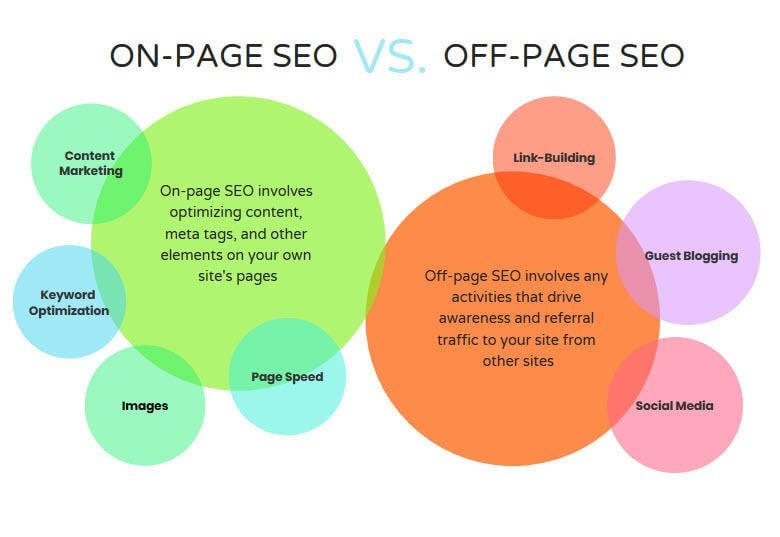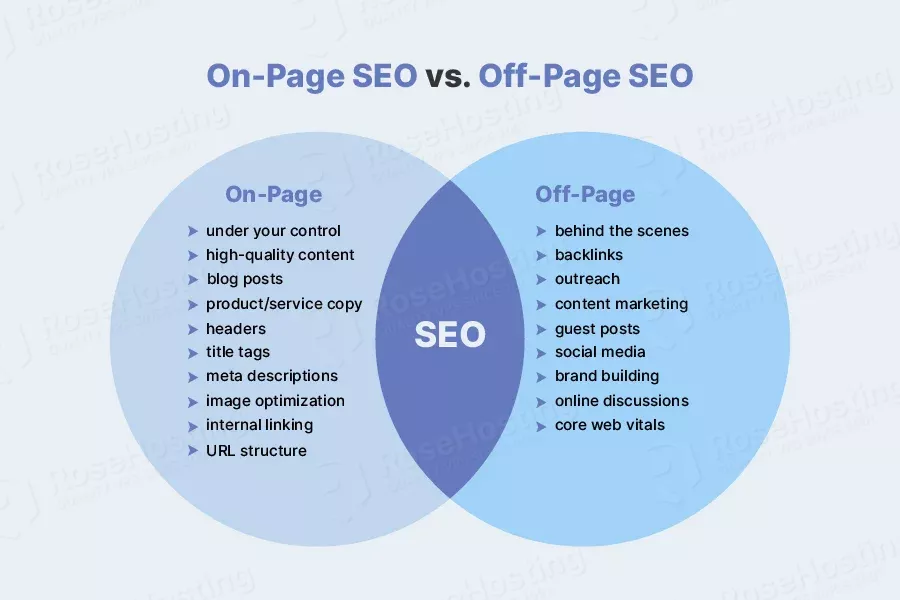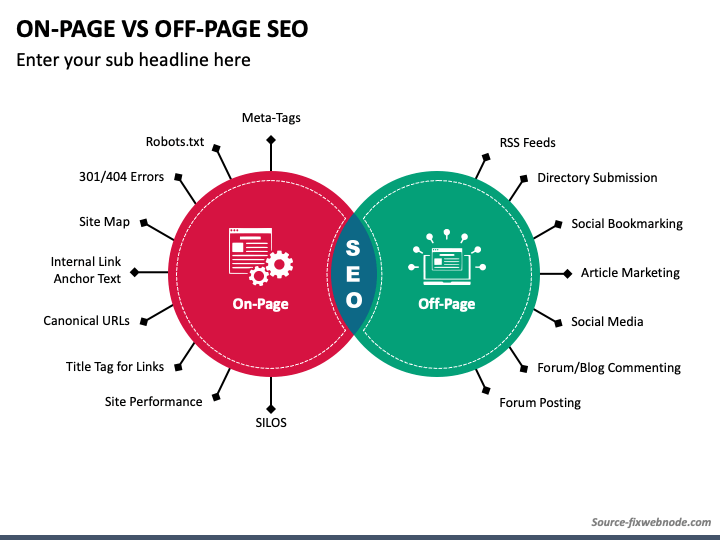Discover the ultimate guide to on-page and off-page SEO tactics and learn which strategy will skyrocket your website’s rankings.

Image courtesy of via DALL-E 3
Table of Contents
Introduction to SEO
When you search for something on Google, have you ever wondered why some websites appear at the top of the page while others are buried deep down? This is where SEO comes into play. SEO, which stands for Search Engine Optimization, is like a magic spell that helps websites rank higher on search engines like Google. Let’s dive into the world of SEO and uncover why it is so important.
What is SEO?
SEO is all about making your website more attractive to search engines so that they display it to people searching for related topics. Imagine you have a secret treasure map, and you want others to find it. SEO is like adding bright colors and flashing lights to your map so people can easily spot it.
Why SEO is Important
Now, think of the internet as a massive library with billions of books (websites). If your book (website) doesn’t have a good index (SEO), nobody will know it exists. SEO helps your website get noticed among the sea of other sites and attracts visitors who are looking for what you offer. It’s like putting a big sign outside your house saying, “Come on in, we have what you need!”
Understanding On-Page SEO
On-Page SEO refers to optimizing individual web pages to rank higher and earn more relevant traffic in search engines. It involves tweaking elements on your own website to improve visibility and increase organic traffic. By focusing on On-Page SEO, you can enhance the user experience and make it easier for search engines like Google to understand and index your content.
Key Elements of On-Page SEO
When it comes to On-Page SEO, several key elements play a crucial role in determining your website’s search engine ranking. These elements include:
1. Meta Tags: These are HTML tags that provide metadata about your webpage. The meta title and meta description are essential for letting search engines and users know what your content is about.
2. Headings: Proper use of headings (H1, H2, H3, etc.) helps organize your content and make it more readable for both users and search engines. Headings also signal the importance of different sections of your content.
3. Content Quality: High-quality, relevant, and engaging content is key to attracting and retaining visitors. Make sure your content is well-written, informative, and adds value to your audience.
By optimizing these elements and following best practices for On-Page SEO, you can improve your website’s visibility in search engine results and drive more organic traffic to your site.
Important On-Page SEO Factors
When it comes to optimizing your website for search engines, paying attention to key On-Page SEO factors is crucial for improving your ranking and visibility online. Let’s dive into some of the essential elements that can significantly impact your website’s SEO performance.

Image courtesy of www.wordstream.com via Google Images
Title Tags and Meta Descriptions
Title tags and meta descriptions are critical components of On-Page SEO. Title tags appear as the clickable headline in search engine results and should provide a concise and relevant description of the page’s content. Meta descriptions, on the other hand, offer a brief summary of what the page is about. Including relevant keywords in both the title tag and meta description can help search engines understand the content of your page and improve its visibility in search results.
Content and Keywords
Creating high-quality and relevant content is key to successful On-Page SEO. By incorporating relevant keywords naturally throughout your content, you can signal to search engines what your page is about and improve its chances of ranking for those keywords. However, it’s essential to avoid keyword stuffing, which can negatively impact user experience and harm your SEO efforts. Focus on creating valuable content that resonates with your audience while strategically incorporating relevant keywords.
Internal Linking
Internal linking plays a crucial role in On-Page SEO by connecting different pages within your website. By strategically linking to other relevant pages on your site, you can help search engines understand the structure of your website and the relationships between different pages. Internal linking also helps distribute link equity throughout your site, boosting the visibility of important pages and improving overall site navigation for users.
Understanding Off-Page SEO
Off-Page SEO refers to all the actions taken outside of your own website to impact your rankings within search engine results pages (SERPs). In simpler terms, it involves optimizing factors that are not within your direct control on your website.
Key Elements of Off-Page SEO
Off-Page SEO mainly revolves around building backlinks and enhancing social media engagement. Backlinks are links from other websites that direct traffic to your site, acting as a vote of confidence in the eyes of search engines. Social media engagement involves sharing your content across various platforms to boost visibility and drive traffic to your website.
Important Off-Page SEO Factors
Backlink building is a crucial factor in Off-Page SEO. Backlinks are links from other websites that lead back to your site. Search engines like Google consider backlinks as a vote of confidence in your website’s credibility and relevance. The more high-quality backlinks you have, the better your site is likely to rank in search results.

Image courtesy of www.rosehosting.com via Google Images
Social Media Engagement
Social media plays a significant role in Off-Page SEO. Engaging with your audience on platforms like Facebook, Twitter, and Instagram can drive traffic to your site and increase brand visibility. When your content gets shared on social media, it can lead to more backlinks and improve your site’s authority in the eyes of search engines.
Influencer Marketing
Influencer marketing is another effective Off-Page SEO strategy. Collaborating with influencers in your industry can help you reach a larger audience and gain more backlinks. Influencers have dedicated followers who trust their recommendations, making them valuable partners in boosting your site’s visibility and credibility.
Reputation Management
Your online reputation plays a crucial role in Off-Page SEO. Managing customer reviews, responding to feedback, and maintaining a positive brand image can impact how search engines view your site. A good reputation can result in more backlinks, higher rankings, and increased trust from both users and search engines.
Comparing On-Page and Off-Page SEO
In the world of SEO, two main strategies reign supreme: On-Page SEO and Off-Page SEO. While both are essential for boosting a website’s visibility and ranking on search engines, they work in different ways to achieve the common goal of driving traffic to your site. Let’s dive into the key differences between On-Page and Off-Page SEO and how they complement each other to form a robust SEO strategy.
Key Differences
On-Page SEO focuses on optimizing the content and structure of your website’s individual pages to make them more search engine-friendly. This includes elements like meta tags, headings, keyword usage, and content quality. In contrast, Off-Page SEO involves external factors like backlinks, social media engagement, and influencer marketing to boost your site’s credibility and authority in the eyes of search engines.
While On-Page SEO deals with what you can control directly on your website, Off-Page SEO relies on factors outside of your website’s domain to improve your site’s search engine ranking. By understanding these differences, website owners can tailor their SEO strategies accordingly to cover all bases and improve their online presence.
How They Work Together
It’s important to recognize that On-Page and Off-Page SEO are not mutually exclusive; they work hand in hand to enhance your website’s overall SEO performance. On-Page SEO sets the foundation by ensuring that your website is optimized for search engines, making it easier for them to crawl and index your content effectively. This establishes a strong base for Off-Page SEO efforts to build upon.
Off-Page SEO, on the other hand, helps to strengthen your website’s authority and credibility by obtaining high-quality backlinks from reputable sources, engaging with your audience on social media platforms, collaborating with influencers, and managing your online reputation effectively. These external factors play a crucial role in determining your website’s ranking in search engine results pages (SERPs).
By combining the power of On-Page and Off-Page SEO, website owners can create a comprehensive SEO strategy that addresses both internal and external aspects of optimization. This holistic approach increases the chances of achieving higher rankings, driving more organic traffic to your site, and ultimately growing your online presence and business.
Implementing an Effective SEO Strategy
Balancing On-Page and Off-Page SEO
When it comes to implementing a successful SEO strategy, finding the right balance between On-Page and Off-Page SEO is crucial. On-Page SEO focuses on optimizing your website’s content and structure to make it more search engine-friendly, while Off-Page SEO involves activities outside your website that impact your site’s authority and relevance.
For a well-rounded SEO approach, it’s essential to pay attention to both aspects. Ensure your website has high-quality, relevant content with optimized title tags, meta descriptions, and internal linking (On-Page SEO), while also building a strong backlink profile, engaging on social media platforms, and working with influencers (Off-Page SEO).
By striking a balance between On-Page and Off-Page SEO strategies, you can increase your website’s visibility, attract more organic traffic, and improve your search engine rankings.
Continuous Improvement
Implementing an effective SEO strategy is an ongoing process that requires continuous improvement and adaptation. Search engines like Google frequently update their algorithms, which can affect how websites are ranked.
To stay ahead in the ever-evolving world of SEO, it’s essential to monitor your website performance regularly, track your keyword rankings, analyze your competitors’ strategies, and make necessary adjustments to your SEO tactics.
Remember, SEO is not a one-time effort but a long-term commitment. By continuously refining and enhancing your SEO strategy, you can stay competitive in the digital landscape and ensure your website remains visible to your target audience.
Common SEO Mistakes to Avoid
One common mistake that website owners make is neglecting On-Page SEO. On-Page SEO is essential for optimizing your website’s content and structure to rank higher in search engine results. Ignoring this aspect of SEO can significantly impact your site’s visibility and ultimately hinder your online success.

Image courtesy of www.sketchbubble.com via Google Images
Neglecting Off-Page SEO
Another critical error to avoid is neglecting Off-Page SEO strategies. Off-Page SEO involves activities outside of your website that impact your site’s authority and credibility, such as acquiring backlinks and engaging on social media. By overlooking Off-Page SEO, you miss out on opportunities to strengthen your site’s reputation and improve its ranking in search results.
Not Adapting to Changes
One of the biggest SEO mistakes is failing to adapt to the constant changes in search engine algorithms and SEO best practices. Search engines like Google frequently update their algorithms, which can impact your website’s ranking if you do not stay informed and adjust your SEO strategies accordingly. It is crucial to stay updated with the latest trends and techniques in SEO to ensure your website remains competitive and visible to your target audience.
Summary
In this blog post, we explored the crucial world of Search Engine Optimization (SEO) and why it is essential for websites to rank well on popular search engines like Google. SEO helps websites attract visitors and improve visibility online.
Recap of On-Page SEO
On-Page SEO involves optimizing elements within a website to enhance its search engine ranking. This includes focusing on content quality, meta tags, and keywords to ensure the site is easily discoverable by search engines.
Recap of Off-Page SEO
Off-Page SEO emphasizes factors external to the website, such as backlinks and social media engagement, to improve the site’s credibility and authority in the eyes of search engines. Building a strong online presence is crucial for effective Off-Page SEO.
Final Thoughts
Both On-Page and Off-Page SEO are vital components of a successful SEO strategy. While On-Page SEO optimizes the website itself, Off-Page SEO focuses on building a solid reputation and credibility across the web. Utilizing a combination of both approaches is key to achieving long-term success in search engine rankings.
Frequently Asked Questions (FAQs)
What is SEO?
SEO stands for Search Engine Optimization. It is the process of optimizing your website to rank higher on search engines like Google. This helps your website get more visibility and attract more visitors.
Can I focus on just On-Page or Off-Page SEO?
While both On-Page and Off-Page SEO are important, focusing on just one aspect is not enough to have a successful SEO strategy. It is crucial to work on both On-Page elements like content and keywords, as well as Off-Page factors like backlinks and social media engagement to achieve the best results.
How long does it take to see results from SEO?
The time it takes to see results from SEO can vary depending on various factors such as the competitiveness of your industry, the quality of your SEO efforts, and the current state of your website. Generally, it may take a few weeks to several months to see significant improvements in your search engine rankings. Patience is key when it comes to SEO, as it is a long-term strategy that requires continuous effort and monitoring.







